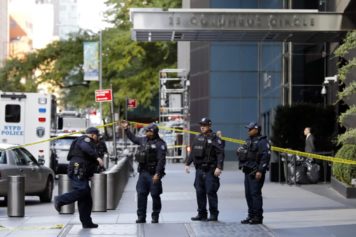A top Iranian military official says that American bases in the Middle East are fair game for retaliation should his country be attacked by Israel.
General Amir Ali Hajizadeh, a senior commander in Iran’s Revolutionary Guard, issued the warning amidst rising tensions with Israel over an Iranian nuclear program that Tehran insists is peaceful purposes only.
The Israelis have insisted otherwise and have threatened unilateral military action against the Iranian nuclear sites to prevent the radical Islamic country from attaining a nuclear weapon.
In an interview with Iranian state television, Hajizadeh said U.S. bases would also be targeted in retaliation because no Israeli attack would be possible without American help and prior knowledge.
“For this reason, we will enter a confrontation with both parties and will definitely be at war with American bases should a war break out,” Hajizadeh said in remarks that were posted on the website of Iran’s state Al-Alam TV.
U.S. facilities in Bahrain, Qatar and Afghanistan would be targeted, he said.
“There will be no neutral country in the region,” Hajizadeh said. “To us, these bases are equal to U.S. soil.”
The U.S. Fifth fleet is based in Bahrain and the U.S. has a heavy military presence in Afghanistan.
The menacing comments about a wider regional war were intended for consumption by not only the U.S. and Israel, but for other countries within region about the potential consequences of any Israeli attack. Iran wants to make clear to America’s Gulf Arab allies that a conflict could potentially disrupt oil shipment and cripple business hubs in places such as Dubai and Qatar’s capital Doha.
The Iranian tough talk comes during a major show of naval power in the Gulf by U.S.-led forces taking part in military exercises, including mine-sweeping drills. The U.S. Navy claims the maneuvers are not directly aimed at Iran, but the West and its regional allies have made clear they would react against any attempts to try to close critical Gulf oil shipping lanes. Iranian officials have previously threatened to close the strategically important waterway for a fifth of the world’s oil if there is war.
Despite Israeli hints of a military strike, Iran’s military commanders believe Israel is unlikely to take unilateral action. The Guard’s top commander, Gen. Mohammad Ali Jafari, said last week that Iran believes the U.S. won’t attack Iran because its military bases in the Middle East are within the range of Iran’s missiles.
Israel believes that any attack on Iran would likely unleash retaliation in the form of Iranian missiles, as well as rocket attacks by Iranian proxies Hezbollah and Hamas on its northern and southern borders.
Israeli Prime Minister Benjamin Netanyahu says international diplomatic efforts and economic sanctions against Iran have failed to deter its nuclear ambitions. He has urged President Barack Obama to declare “red lines” that would trigger an American attack on Iran’s nuclear facilities, while steadfastly maintaining Israel’s right to assure its own security.
Obama has rejected these calls, saying diplomacy and U.S.-led sanctions must be given more time and that Iran will never be allowed to obtain nuclear weapons. American officials worry that a unilateral Israeli attack could set off a large-scale military conflict throughout the Middle East that might hamper Obama’s re-election chances in November.
Iran’s President Mahmoud Ahmadinejad is currently in New York to attend the annual U.N. General Assembly and could seek to use his speech and meetings later this week to highlight the possible risks – including sharply higher oil prices – if military action is taken.
Israel is believed to have successfully attacked nuclear sites in both Iraq (1981) and Syria (2007), although Tel Aviv has never acknowledged responsibility for the actions.


